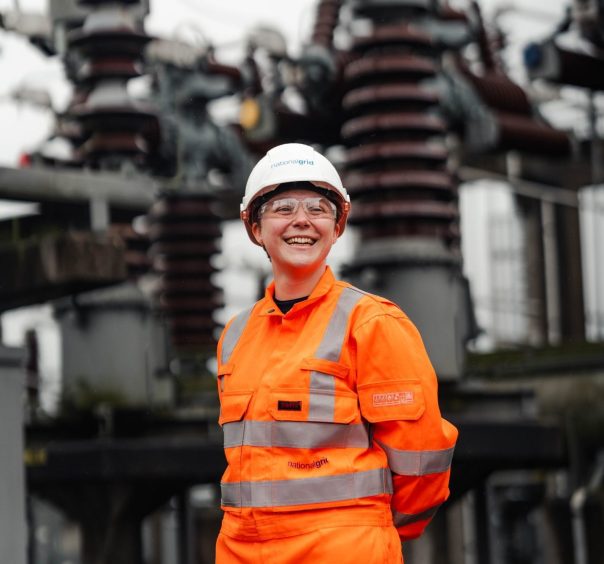
Apprenticeships are vital for developing the skills needed to accelerate the delivery of clean energy infrastructure and to help the UK reap the rewards of the energy transition: economic growth, energy security and less exposure to volatile gas prices.
But how have apprenticeships in this sector changed over the decades? And what does the future hold for these vital programmes? To explore these questions, two remarkable individuals – Phil Grant and Imogen Munn – share their unique experience of their apprenticeship journeys, two decades apart.
Introductions
Phil is a network manager at National Grid Electricity Transmission. He completed an advanced modern apprenticeship in electrical/electronic engineering age 16 before joining National Grid on a Higher Apprenticeship scheme, where he also completed a foundation degree in Power Systems. He has been working in the energy industry for over 15 years.
Imogen started her apprenticeship in 2023 and is a second-year higher apprentice at National Grid, studying to become an electrical power plant protection and commissioning engineer. She has already been to university and has a degree in Intercultural Communication and Business Management.
What do you think employers can do to make sure apprentices thrive?
Imogen: For me, it’s support. It can be daunting to travel to a new site, for example, but the experience has given me important life skills such as communicating with all sorts of professionals from different backgrounds. Having the support of the team around me as I got used to doing this was really key.
Mentors who have joined the business in the same way are great at helping apprentices as they understand the pressures we face.
Phil: Time with more experienced team members is really important. Apprentices are keen to learn and get on in their careers and they need support from those in the sector, particularly early on. It’s difficult when you start your course as you are away from home a fair amount on site and there is a lot of work to do in terms of assessments. Being supportive, offering a friendly ear can really help.
Adjusting to life as an apprentice and field work can be difficult in those first few days and weeks. Despite technology advancements over the last couple of decades, people still miss home regardless of how many times they call or facetime one another.
I echo Imogen’s comments about having a mentor too, they are invaluable throughout your career, not just those early days. Helping people to build their network and simply acknowledging that it can be hard for people is really important.
What would you say to businesses who might be hesitant about increasing the number of apprentices in their workforce?
Phil: Apprentices are a great asset to any business. I have twenty years’ experience and still use the skills and training I learned as an apprentice. They bring fresh thinking and skills to the field and open the sector to people from all walks of life.
I chose an apprenticeship to gain real industry experience from day one. I couldn’t wait to leave school but wanted to continue learning and gain a recognised qualification. I completed lots of placements during my first apprenticeship back in 2004 with Meggitt Aircraft Braking Systems, but once I had completed my initial qualifications, I wanted more. That’s why I moved to National Grid and my second apprenticeship.
This sense of continued learning and development is something businesses should encourage and has stayed with me throughout my career. In a fast-paced environment like the energy sector, on-the-job learning helps people to solve problems, adapt to new situations and keeps people engaged in their roles over the longer term. They are skills for life.
Imogen: I think we bring a lot of value to the workplace. We are learning on the job, gaining practical experience and applying these skills in real-world situations.
Like Phil, I think apprenticeships have multiple benefits, not only do you get paid to learn, but the training is specific to the job role, so a job is (almost) guaranteed at the end. For me the big draw is the career progression opportunities and working in a strong and supportive team. I see this as a huge benefit for businesses too. Supporting the growth of the workforce and the ability to keep learning, can only be a good thing for both employers and employees.
What value do you think apprentices bring to a company?
Phil: My apprenticeships have given me a really good grounding for understanding the complexities which form our critical network. Both courses have helped me to see the value in really understanding different parts of the business.
Apprenticeships provide the opportunity to learn on the job and I don’t think that ever changes. New sites or new roles, there’s always something to learn and everyone brings a new perspective. That can only be a good thing.
What value do you think an apprenticeship will bring to your future career?
Imogen: To be totally honest, I don’t know where my career will take me right now but I do know that the skills I have learnt as an apprentice will be with me for life. There are so many opportunities and routes open to me following my apprenticeship, so I want to keep learning and keep exploring. It’s a real honour to work at the forefront of the energy transition.
Recommended for you

